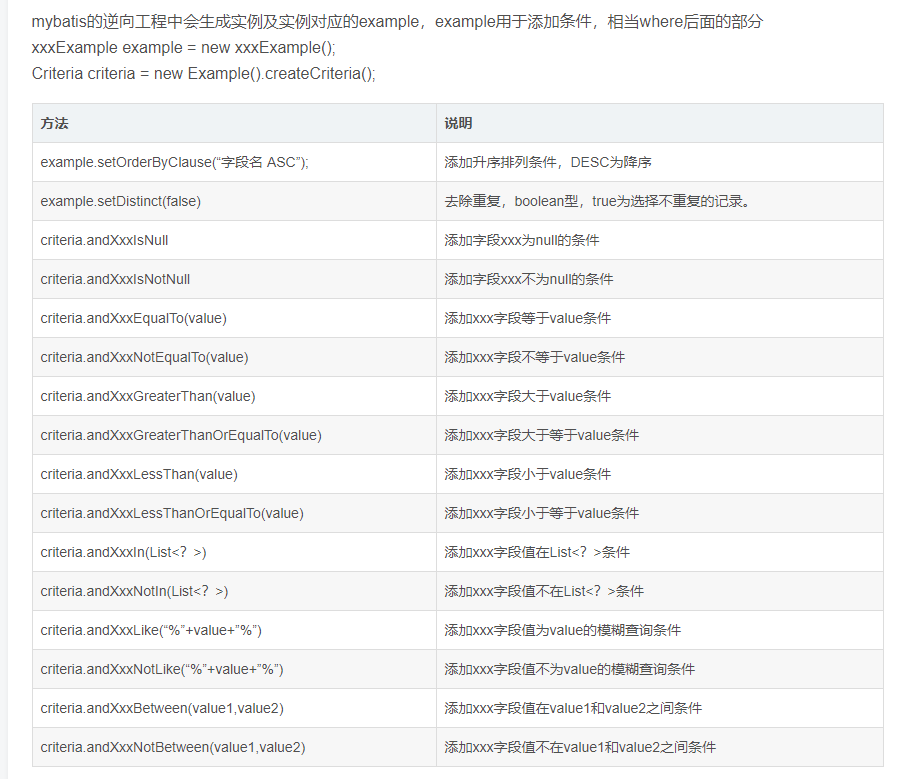依赖
正常情况下,在原有依赖基础上增加的 mapper-spring。
<!-- https://mvnrepository.com/artifact/tk.mybatis/mapper-spring --> <dependency> <groupId>tk.mybatis</groupId> <artifactId>mapper-spring</artifactId> <version>1.0.5</version> </dependency>
如果想使用其他版本的依赖文件,可以在Maven仓库上搜索“tk.mybatis”。
配置
MapperScannerConfigurer xml
<bean class="tk.mybatis.spring.mapper.MapperScannerConfigurer"> <property name="basePackage" value="tk.mybatis.mapper.mapper"/> <property name="sqlSessionFactoryBeanName" value="sqlSessionFactory"/> <property name="properties"> <value> mappers=tk.mybatis.mapper.common.Mapper </value> </property> </bean>
@MapperScan 注解
Spring Boot 环境中使用 application.properties] 配置文件
在 Spring Boot 中使用 Mapper 时,如果选择使用注解方式,可以不引入 mapper-starter 依赖。
特别提醒:Spring Boot 中常见的是配置文件方式,使用环境变量或者运行时的参数都可以配置,这些配置都可以对通用 Mapper 生效。
在 propertie 配置中:
mapper.mappers=tk.mybatis.mapper.common.Mapper,tk.mybatis.mapper.common.Mapper2
mapper.not-empty=true
tk.mybatis.mapper.session.Configuration 配置
使用要求:MyBatis (3.4.0+) 和 mybatis-spring (1.3.0+)
注意该类的包名,这个类继承了 MyBatis 的 Configuration 类,并且重写了 addMappedStatement 方法,如下:
@Override public void addMappedStatement(MappedStatement ms) { try { super.addMappedStatement(ms); //在这里处理时,更能保证所有的方法都会被正确处理 if (this.mapperHelper != null) { this.mapperHelper.processMappedStatement(ms); } } catch (IllegalArgumentException e) { //这里的异常是导致 Spring 启动死循环的关键位置,为了避免后续会吞异常,这里直接输出 e.printStackTrace(); throw new RuntimeException(e); } }
tk.mybatis.mapper.session.Configuration 提供了 3 种配置通用 Mapper 的方式,如下所示:
/** * 直接注入 mapperHelper * * @param mapperHelper */ public void setMapperHelper(MapperHelper mapperHelper) { this.mapperHelper = mapperHelper; } /** * 使用属性方式配置 * * @param properties */ public void setMapperProperties(Properties properties) { if (this.mapperHelper == null) { this.mapperHelper = new MapperHelper(); } this.mapperHelper.setProperties(properties); } /** * 使用 Config 配置 * * @param config */ public void setConfig(Config config) { if (mapperHelper == null) { mapperHelper = new MapperHelper(); } mapperHelper.setConfig(config); }
这里直接配置一个 tk 中提供的 Configuration,然后注入到 SqlSessionFactoryBean 中。
使用 tk.mybatis.mapper.session.Configuration 和 Spring 集成
@Bean public SqlSessionFactory sqlSessionFactory() throws Exception { SqlSessionFactoryBean sessionFactory = new SqlSessionFactoryBean(); sessionFactory.setDataSource(dataSource()); //创建 Configuration,设置通用 Mapper 配置 tk.mybatis.mapper.session.Configuration configuration = new tk.mybatis.mapper.session.Configuration(); //有 3 种配置方式 configuration.setMapperHelper(new MapperHelper()); sessionFactory.setConfiguration(configuration); return sessionFactory.getObject(); }
代码演示
创建一个超类接口,继承通用mapper内部的所有方法,然后就可以直接调用了。
public interface BaseMapper<T> extends InsertSelectiveMapper<T>, UpdateByExampleSelectiveMapper<T>, UpdateByPrimaryKeySelectiveMapper<T>, SelectOneMapper<T>, SelectByPrimaryKeyMapper<T>, SelectMapper<T>, SelectByExampleMapper<T>, SelectByExampleRowBoundsMapper<T>, SelectCountByExampleMapper<T> {}
下面介绍一下通用Mapper的内置方法
countByExample --- 根据条件查询数量
int countByExample(UserExample example); //完整案例 UserExample example=new UserExample(); Criteria criteria = example.createCriteria(); criteria.andAgeEqualTo(23); int count=userDAO.countByExample(example); //相当于:select count(*) from user where age=23;
deleteByExample --- 根据条件删除多条
int deleteByExample(AccountExample example); //完整的案例 UserExample example = new UserExample(); Criteria criteria = example.createCriteria(); criteria.andUsernameEqualTo("joe"); userDAO.deleteByExample(example); //相当于:delete from user where username='joe'
deleteByPrimaryKey ---根据主键删除
int deleteByPrimaryKey(Integer id); //完整案例 userDAO.deleteByPrimaryKey(101); //相当于:delete from user where id=101
insertSelective --- 插入数据
int insertSelective(Account record); //完整的案例 User user = new User(); user.setUsername("test"); user.setPassword("123456") user.setEmail("674531003@qq.com"); userDAO.insertSelective(user); //相当于:insert into user(username,password,email) values('test','123456','674531003@qq.com');
selectByExample --- 根据条件查询数据
List<Account> selectByExample(AccountExample example); //完整的案例 UserExample example = new UserExample(); Criteria criteria = example.createCriteria(); criteria.andUsernameEqualTo("joe"); criteria.andUsernameIsNull(); example.setOrderByClause("username asc,email desc"); List<?> list = userDAO.selectByExample(example); //相当于:select * from user where username = 'joe' and username is null order by username asc,email desc //注:在myBatis 生成的文件UserExample.java中包含一个static 的内部类 Criteria ,在Criteria中有很多方法,主要是定义SQL 语句where后的查询条件。
selectByPrimaryKey --- 根据主键查询数据
Account selectByPrimaryKey(Integer id); //相当于select * from user where id = id
updateByExampleSelective --- 按条件更新值不为null的字段
int updateByExampleSelective(@Param("record") Account record, @Param("example") AccountExample example); //完整的案列 UserExample example = new UserExample(); Criteria criteria = example.createCriteria(); criteria.andUsernameEqualTo("joe"); User user = new User(); user.setPassword("123"); userDAO.updateByPrimaryKeySelective(user,example); //相当于:update user set password='123' where username='joe'
updateByPrimaryKeySelective --- 根据主键更新
int updateByPrimaryKeySelective(Account record); //完整的案例 User user = new User(); user.setId(101); user.setPassword("joe"); userDAO.updateByPrimaryKeySelective(user); //相当于:update user set password='joe' where id=101
最后补一张从网上盗的关于Example的图
